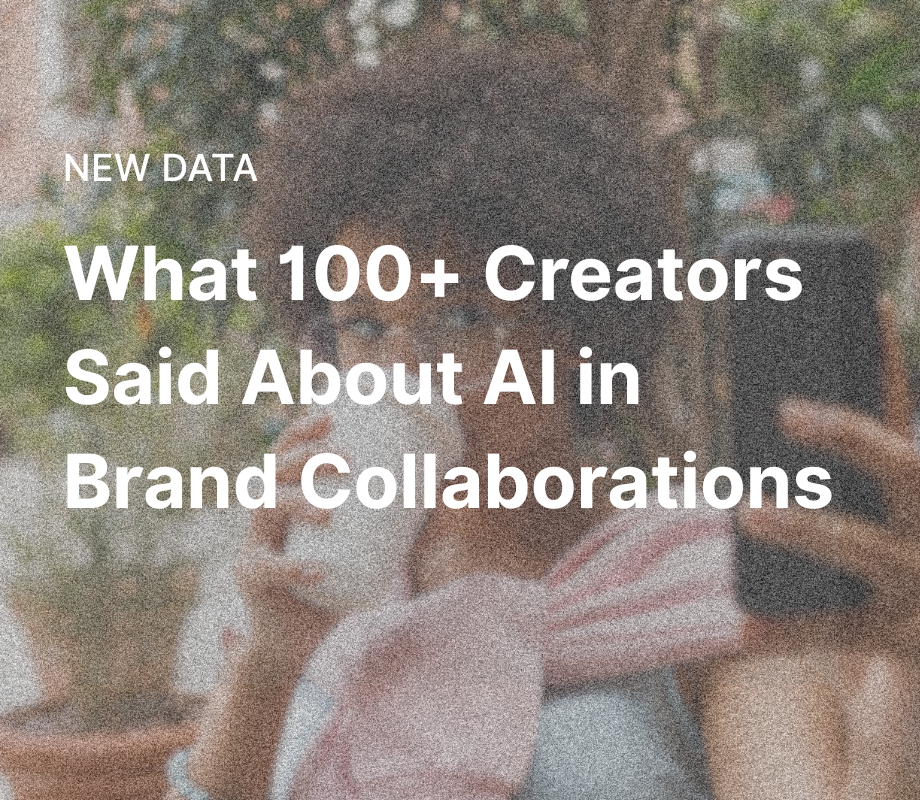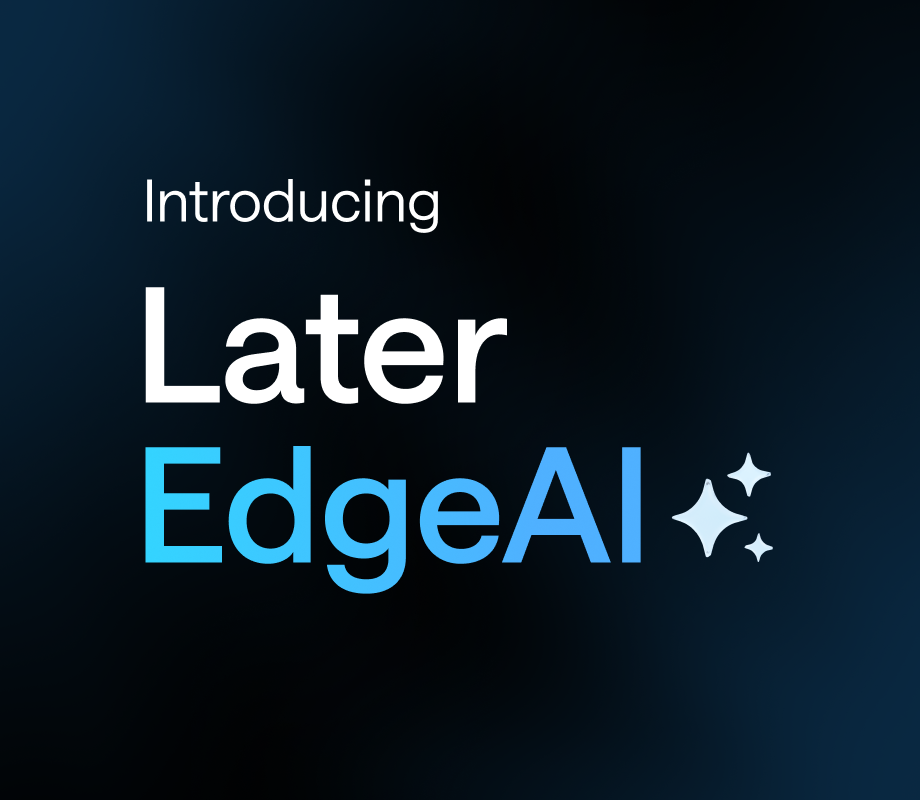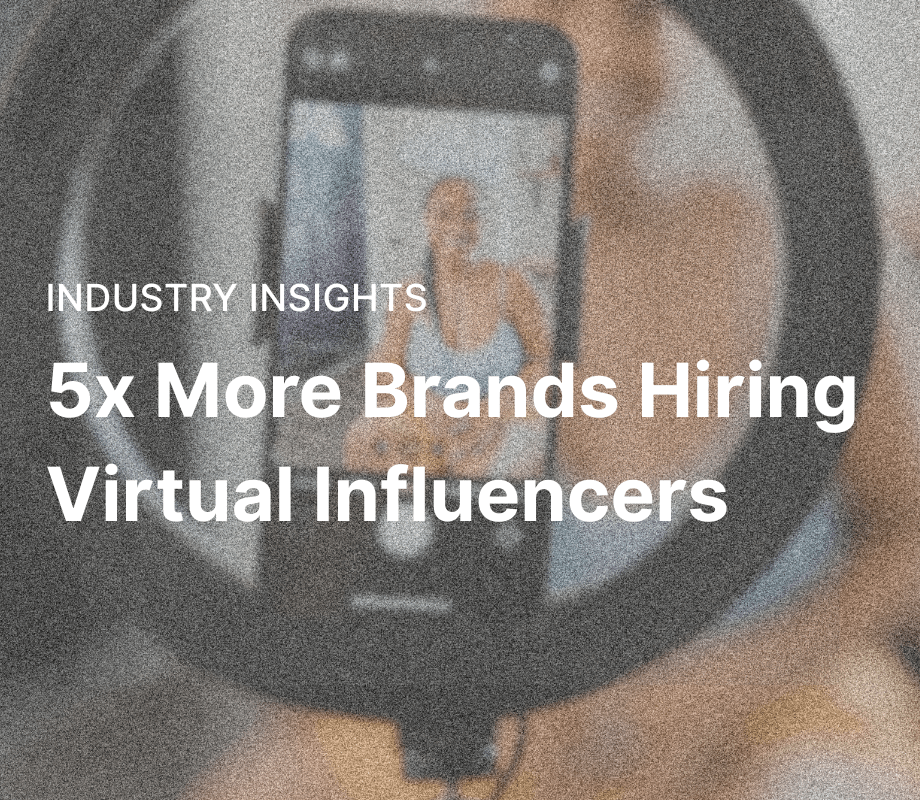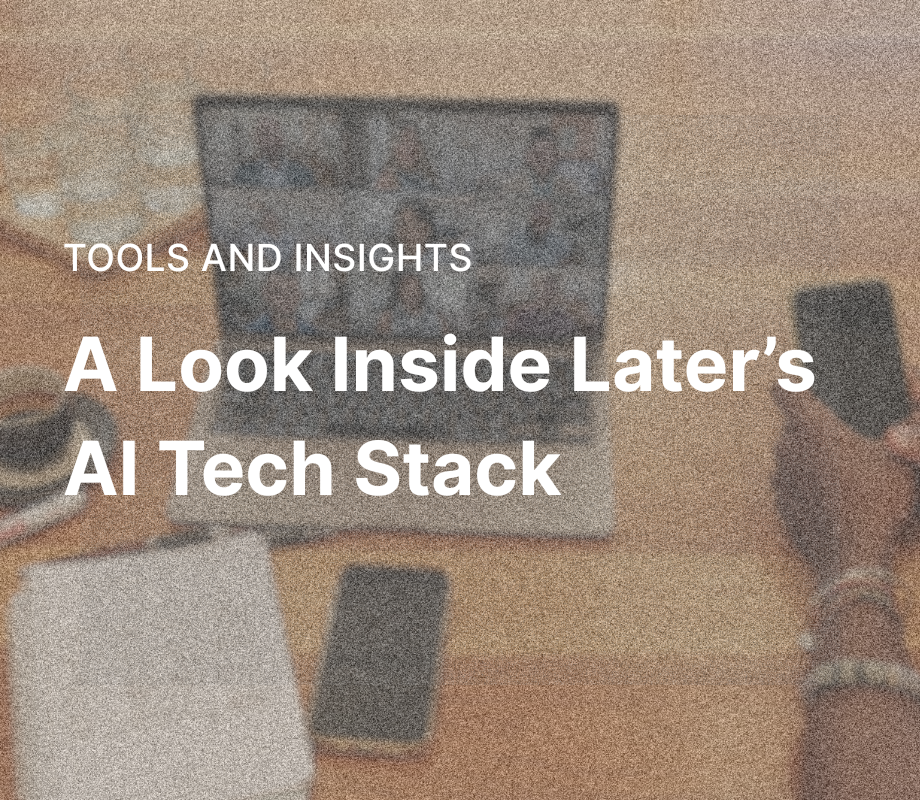TL;DR
87% of creators expect AI to become essential to influencer work within two years, with widespread adoption already underway across ideation (76%), copywriting (58%), and editing (36%).
Creators report measurable improvements: 87% see higher content quality with AI assistance, and 75% report improved campaign performance compared to pre-AI work.
Negative reactions are minimal: only 0.8% of audiences and 1.7% of brands react negatively when creators disclose AI use, debunking authenticity concerns.
The creators seeing the best results train AI tools to match their voice, maintain clear boundaries on what AI helps with, and stay transparent with brand partners about their process.
Table of Contents
Join over 1 million marketers to get social news, trends, and tips right to your inbox!
Email AddressWhile marketing teams debate the merits of artificial intelligence and worry about implementation timelines, creators have already made their decision. They've integrated AI into their daily workflows, and the results speak for themselves.
According to new research from Later* surveying 120 creators who have used AI in the past year, 87% expect artificial intelligence to become essential to influencer work within the next two years. This isn't cautious optimism or speculative forecasting. These are content creators who have tested AI tools extensively, measured the outcomes, and reached a clear conclusion about where the industry is heading.
For brands, this rapid creator adoption of AI represents a significant opportunity rather than a concerning trend. The creators who are leveraging AI most effectively are delivering better content quality, faster turnaround times, and improved campaign performance. Understanding how creators use AI and why they've embraced it so thoroughly can help brands build stronger partnerships and achieve better results from their influencer marketing investments.
How creators are actually using AI
The creator approach to AI is practical and results-oriented as creators have identified specific workflow challenges where AI delivers genuine value.
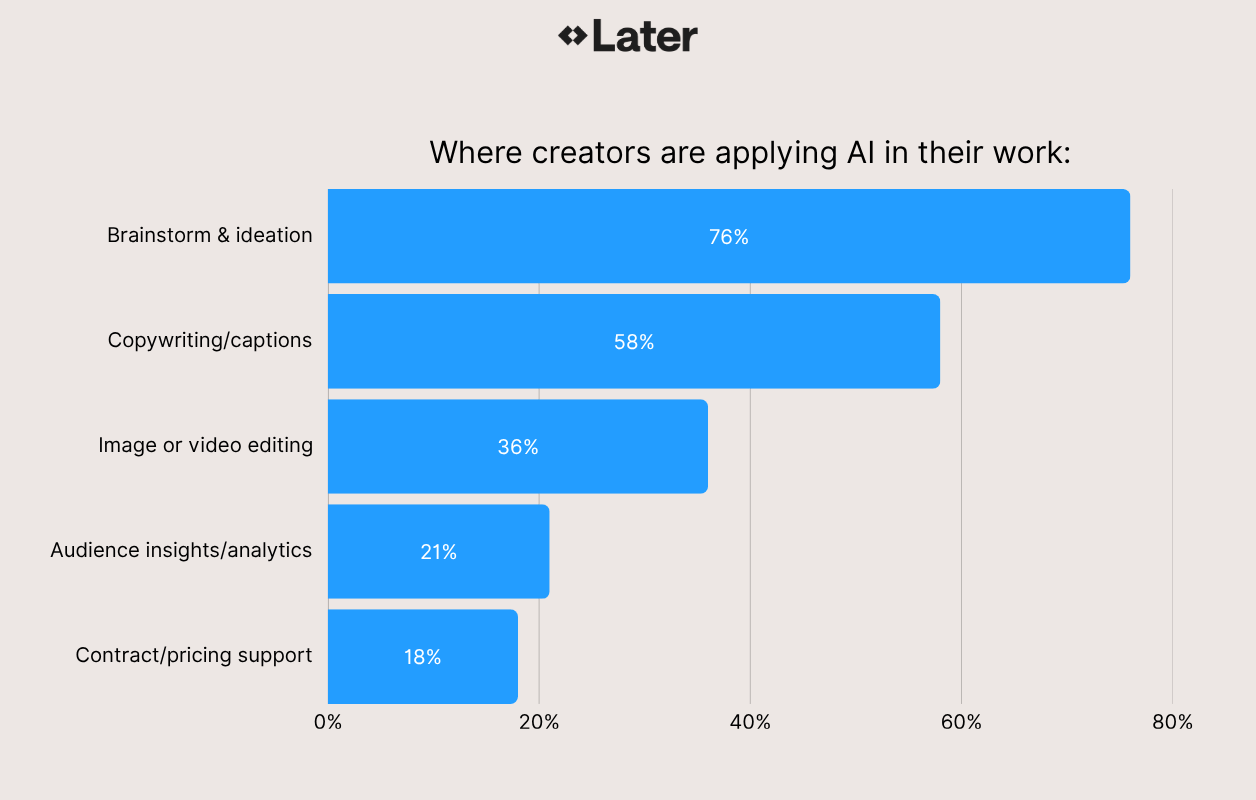
1. Three in four creators (76%) report using AI primarily for brainstorming and ideation.
This represents AI's most common application in creator workflows, addressing one of the most persistent challenges in content creation: coming up with fresh ideas consistently.
2. More than half of creators (58%) rely on AI for copywriting and caption generation.
These creators aren't simply copying and pasting AI-generated text. Instead, they're using AI to help structure their thoughts, refine their messaging, and polish their writing. One survey respondent noted that AI "takes my thoughts and ideas and turns them into a more professional caption," while another emphasized that they use "AI for copywriting, mainly to make things flow smoother" while still creating the original caption themselves.
3. Just over one-third of creators (36%) use AI for image or video editing, with additional applications including audience insights and analytics (21%) and contract or pricing support (18%).
The tool landscape is dominated by ChatGPT, which 94% of AI-using creators report leveraging, with Google Gemini a distant second at 19%.
All of this is good news for brands looking to expand creator partnerships. Creators using AI can deliver content faster without compromising on quality, which translates to more efficient campaigns and better results and sales for brands.
Quality and performance gains creators are seeing with AI
Creators’ enthusiasm for AI is grounded in measurable improvements to their content quality and campaign performance.
When asked about the quality of content produced with AI assistance, 87% of creators report higher quality output. Notably, not a single creator surveyed indicated that AI led to lower-quality content. The worst outcome reported was "no impact" on quality, cited by just 12.5% of respondents.
The performance data tells a similar story. Three-quarters of creators (75%) report improved campaign performance compared to their work before using AI. Only 25% saw no change in performance, and zero creators reported a decline in campaign results after adopting AI.
These improvements manifest in different ways, with creators citing which area has most improved depending on their specific focus and challenges, including:
Higher engagement rates (34.4%)
Faster content turnaround (27.8%)
Better audience targeting (20%)
Increased earnings (10%)
Stronger brand relationships (7.8%).
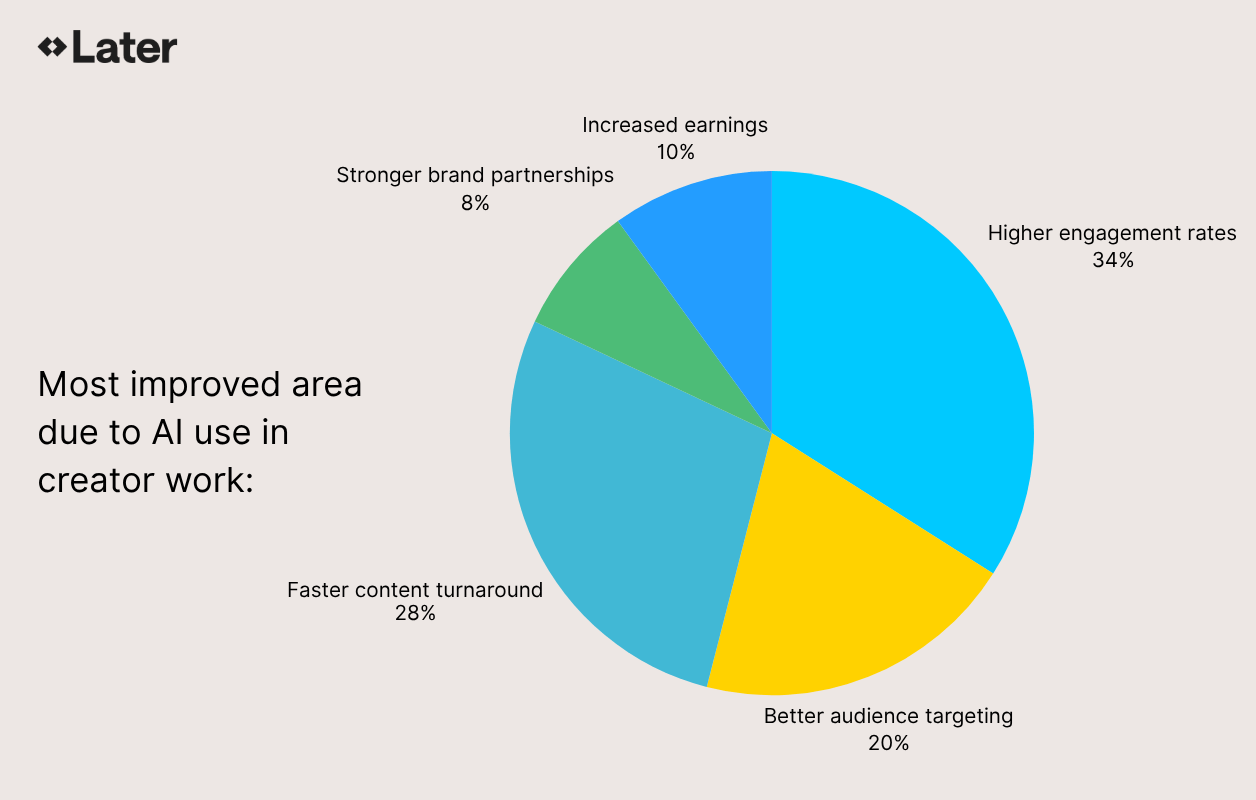
For brands, these creator outcomes should inspire confidence rather than concern. Rather than viewing AI adoption as a red flag, brands should consider it a positive signal that a creator is invested in improving their craft and delivering better results.
Why AI doesn't hurt creator authenticity
The most common concern brands express about creator AI adoption centers on authenticity. If a creator is using AI to help write captions or generate ideas, does that diminish the authentic connection with their audience?
The research data provides a clear answer: No, it doesn't. At least not when creators use AI thoughtfully and transparently.
When creators disclose their AI use to brand partners, the reaction is overwhelmingly neutral or positive. Among creators who choose to disclose AI usage to brands (60% do so), only 2% report negative reactions. The majority (42%) describe brand reactions as neutral, while 16% report positive responses. Brands that reacted positively typically appreciated the improved content quality and, in some cases, noted increased sales resulting from AI-assisted campaigns.
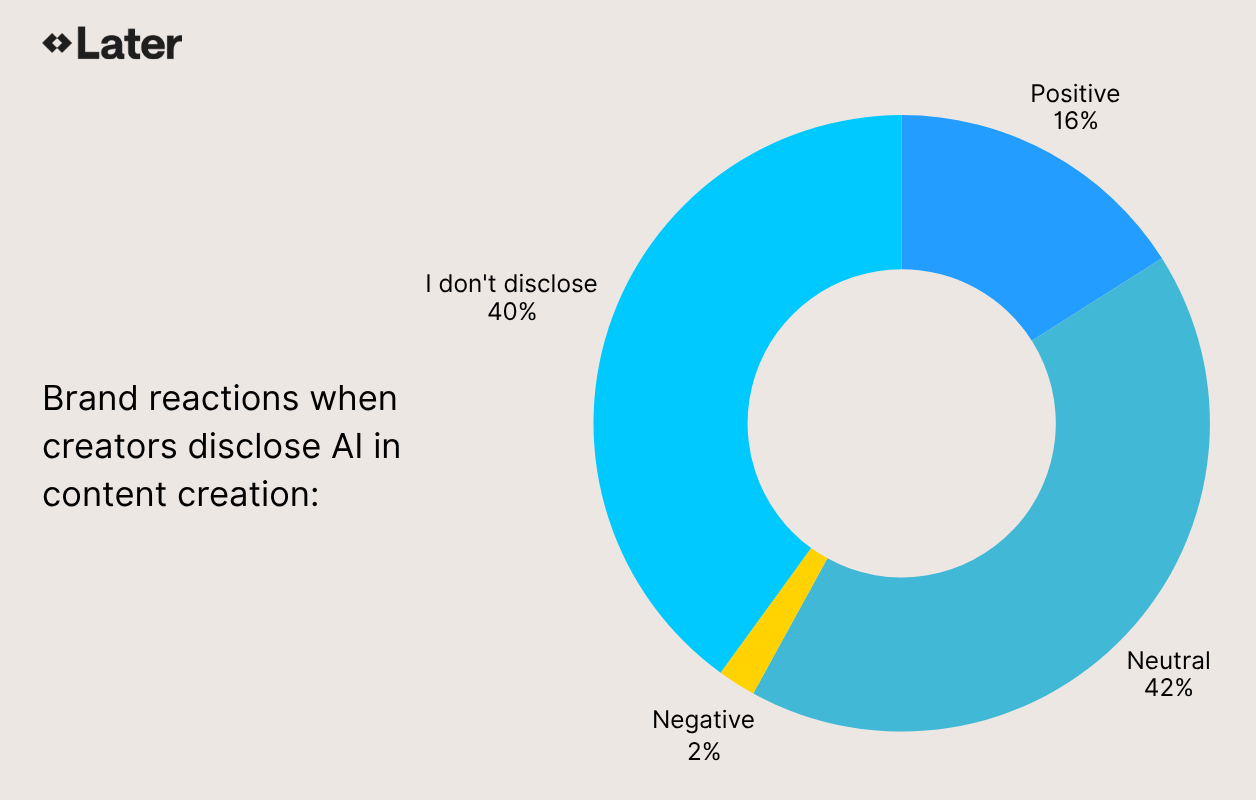
Audience reactions follow a similar pattern. Among creators who disclose AI use to their audiences (53% do so), only 1% report negative reactions. The majority of audience responses are neutral (34%) or positive (18%). Positive audience reactions stem from several factors: general acceptance of AI technology, curiosity and engagement when AI is used for creative visual content, and appreciation for content that maintains the creator's authentic voice even when AI assists in production.
What this means for your creator partnerships
77% of brands using AI in their influencer marketing campaigns report better results, with 37% saying outcomes are "much better." This improvement comes from working with creators who have already woven AI into how they work. The creators most comfortable using these tools are the same ones turning around content faster, delivering more polished final products, and driving stronger campaign results.
As you evaluate and manage creator partnerships in this AI-driven landscape, a few key things are worth keeping in mind:
1. View AI literacy and adoption as a positive signal rather than a concern.
A creator who is actively working to improve their efficiency and content quality through AI is demonstrating professional growth and commitment to delivering results. This is especially true for creators who can articulate how they use AI while maintaining their authentic voice.
2. Bring AI into the conversation early.
When discussing partnerships, frame AI usage as a collaboration rather than a concern. Instead of prohibiting AI use or approaching it with skepticism, ask creators about the tools they're using, the results they're seeing, and how they keep their authentic voice front and center.
3. Set clear disclosure expectations from the start.
Take time to develop your brand's perspective on when and how creators should disclose AI use to their audiences. Some brands prefer full transparency in every case, while others take a more nuanced approach depending on how extensively AI was involved. Either way, nail down these expectations early in the partnership so you're not scrambling to address them later if questions come up.
4. Recognize that AI-savvy creators often deliver more value for the same investment.
The efficiency they gain through AI tools means they can produce more content variations, respond to feedback faster, and maintain consistently high quality across multiple deliverables. The opportunity here lies in maximizing the partnership's impact rather than reducing creator compensation.
For creators: How to integrate AI strategically
The fundamental principle is straightforward: Use AI to enhance your voice rather than replace it. The creators getting the best results treat AI as a creative partner and efficiency tool that supports their work. Let AI help you articulate your ideas more clearly, push through creative blocks, and knock out time-consuming tasks, but keep your perspective, your expertise, and your authentic connection with your audience firmly in your own hands.
1. Focus your AI usage on the tasks that consume the most time without adding the most value. Many creators report that AI has "allowed me to cut my editing time in half." These efficiency gains free you up to focus on what truly differentiates your content: your unique perspective, your relationship with your audience, and your authentic expertise in your niche.
2. Invest time in training AI tools to match your voice and style. The creators who report the best results are those who have taught AI to write in their distinctive tone. This might mean feeding AI examples of your best captions, providing detailed style guidelines, or iterating multiple times until the AI-generated suggestions truly sound like you.
3. Be thoughtful and strategic about disclosure. Both brands and audiences appreciate transparency, but that doesn't necessarily mean disclosing every instance of AI assistance. Develop your own philosophy about when disclosure matters. Many creators disclose AI use when it's substantive (like AI-generated images or extensive caption assistance) but not when it's minor (like using AI to check grammar or generate initial brainstorming lists).
4. Remember that AI is a tool for efficiency and enhancement, not a replacement for the authentic connection you've built with your audience. Brands partner with you because you have a genuine relationship with an engaged community built on trust, consistency, and authenticity. AI should help you maintain and strengthen that relationship by freeing up more time and energy for meaningful engagement.
A strategic opportunity for brands and creators alike
We're at a pivotal moment in influencer marketing. AI technology has matured enough to deliver real value, and creators have embraced it because they're seeing measurable results like higher engagement rates, better audience targeting, and faster turnaround times. Brands working with AI-savvy creators are seeing improved campaign performance and stronger ROI. Platforms like Later EdgeAI—our AI-native predictive intelligence engine trained on 16 million creators and $2 billion in influencer-driven purchases—are helping brands achieve 41% higher engagement rates by matching them with the right AI-savvy creators and forecasting campaign outcomes before launch.
But there's an important nuance here. The rise of virtual influencers shows us where the limits are. While brand familiarity with virtual influencers has jumped from 17% in 2023 to 68% in 2025, half of all brands still cite lack of authenticity as their primary concern.
This tells us what the creator data has been showing all along: AI can make creators more efficient and help them produce better content, but it cannot replace the trust, community connection, and authentic storytelling that drive real business results. The brands positioned to win are those who embrace AI-savvy creators while keeping focus on the fundamentally human elements that make influencer marketing work.
Ready to discover how Later can help your team build more effective partnerships with AI-savvy creators? Schedule a conversation with our team to learn how leading brands are turning creator partnerships into revenue drivers through smarter technology integration and stronger authentic connections.
*Methodology: Later survey of 120 content creators who have used AI in the past 12 months for content/brand collaborations conducted in September 2025.
